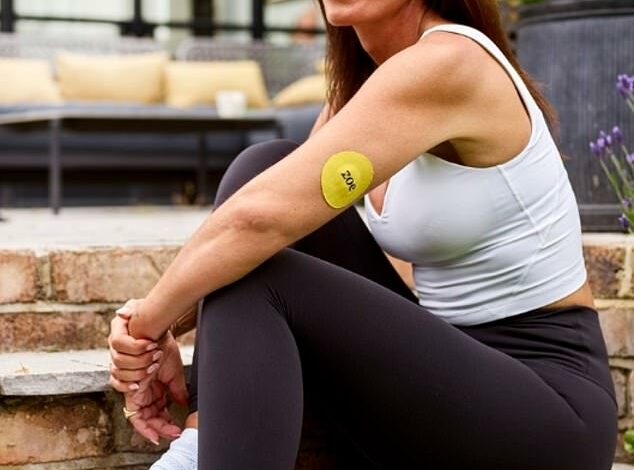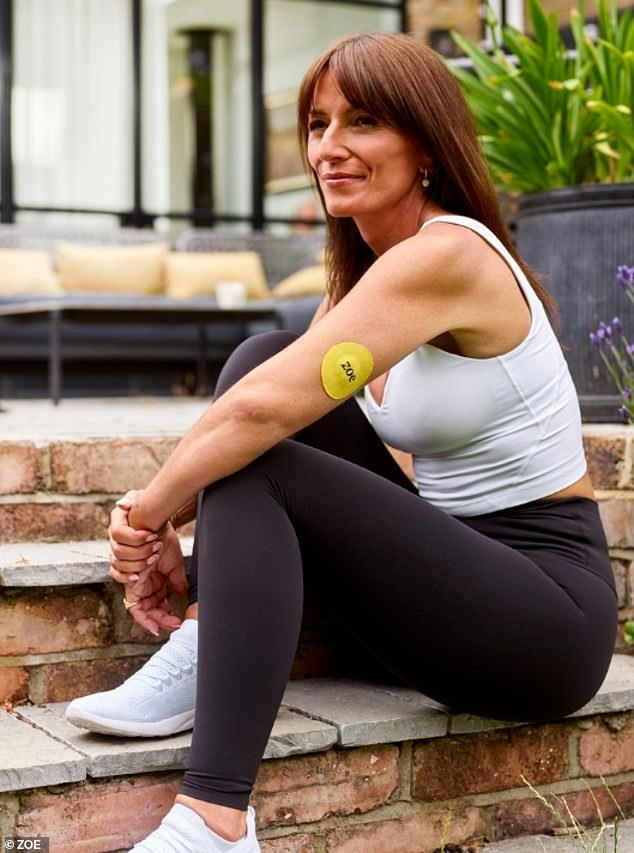Trendy blood sugar monitors endorsed by celebrities are essentially ‘useless’ and won’t keep you thin, new research shows




Portable blood sugar monitors, praised by celebrities such as Davina McCall as an appetite control tool, are effectively useless for people without diabetes – and are unlikely to help with weight loss, experts warn.
The devices, worn as a small round sticker on the arm, provide detailed information about blood sugar levels after eating food through a small probe in the skin that sends information to the paired smartphone.
Although they have been used by diabetics for years, the devices are now increasingly being marketed to healthy people as a way to detect foods that could cause them to have a worrying blood spike.
Health brands such as ZOE from Professor Tim Spector, who sells his own monitor, say avoiding these peaks can help reduce cravings and limit the intake of excess calories.
Identifying the foods that have this effect – and avoiding them – would therefore reduce the risk of obesity and its related diseases.
But a new study, in which experts tested the devices on 30 non-diabetic volunteers, has cast doubt on the accuracy of such monitors for people with healthy blood sugar levels.
Analysis of their results suggests that a healthy person using the devices would have to eat the same meal up to 67 times to get an accurate picture of its effect on blood sugar levels.
In the new experiment, participants were presented with a carefully composed menu for two weeks in a row. The meals in the first week were identical to those in the second week.

Portable blood sugar monitors, loved by celebrities like Davina McCall, are essentially ‘useless’ for non-diabetics, experts warn

The devices – which are no bigger than a £2 coin – send blood sugar level updates to the user’s phone
This allowed scientists at the National Institute of Diabetes and Digestive and Kidney Diseases in the US to compare the accuracy of blood sugar meters for the same exact meal and for the same person, but at two different times.
The results showed that the values were ‘highly variable’ between weeks and also differed greatly from the results of standard blood tests.
Results, published in The American Journal of Clinical Nutritionwere so inconsistent that the authors decided that the monitors, also called continuous glucose monitors (CGM), were essentially ineffective for personalized nutrition.
“CGM responses must be reliable to be useful,” they wrote.
They added: ‘Our study found that the reliability of postprandial CGM responses after eating on many multi-component double meals was poor.’
The researchers said their results came amid a growing trend of healthy adults using the devices as part of getting “personalized nutrition advice.”
Nicola Guess, an academic dietitian and researcher at the University of Oxford who was not involved in the study, said the research showed the devices were “absolutely useless” for healthy people.
‘Proponents of CGMs claim that they help people identify which foods they can’t tolerate – that is, if they eat a banana and they get “a spike” and their partner doesn’t, it means they can’t tolerate the banana, but their partner does.

Several companies, including the ZOE Program – founded by diet guru Professor Tim Spector – offer high-tech gadgets called continuous glucose monitors (CGMs), which track a customer’s blood sugar levels via an adhesive patch on their arm.
“But what this study shows is that you and your partner may both have to eat that food 67 times to tell whether you really respond differently to it.”
She added that there is limited evidence to support the idea that identifying foods that “raise” blood sugar levels has any health benefit.
“It’s silly that people are being asked to ‘monitor’ their glucose with CGMs because as far as we know it’s not a problem as long as it stays within the normal range,” she said.
Blood sugar levels vary from person to person, but are usually between 4 and 6 mmol before a meal, and up to 8 mmol up to two hours after eating.
This isn’t the first time the use of CGMs in healthy people has been questioned.
Earlier this year, experts warned that the devices could potentially cause people to develop anxiety and eating disorders.
Although experts say the evidence for the benefits of CGMs in diabetics was clear, the evidence that they were useful for healthy people was much more limited.
ZOE has claimed on its website that spikes in blood sugar levels can lead to an increased risk of heart disease over time, and offers a diet to help minimize them.
Davina was featured in a number of promotional videos using ZOE’s CGM.
In a post on her Instagram, she described the device as a “trick up my sleeve to ease my sugar spikes and foods that I know trigger me.”
However, several experts have questioned the research evidence behind ZOE’s claims, as well as other similar programs.




